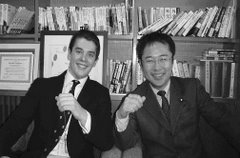However, the real question is not why these people fall asleep, but why the main floor of the House of Representatives is so tediously dull. In the House, 'debate' seems to be a distinctly foreign word.
Every day I try to tune into a programme by BBC Radio 4, called Today in Parliament, which can be listened to for free on the Internet. Broadcast on weekday evenings, it briefly runs through the day's debates in the British Houses of Parliament, taking especial pleasure in covering the numerous vicious debates that crop-up on a daily basis. The Government directly faces the Opposition across the floor of the House of Commons, and there is often genuine hate as Labour attacks the Conservatives, or a Scottish Nationalist Party MP insults the Prime Minister. It is exciting, theatrical and adversarial; a far cry from the parliamentary proceedings of the Japanese Diet.

Japan may have a parliamentary-style democracy, but it is a long way from the British adversarial model. Take, for example, the recent daihyo shitsumon - Leaders' Questions - put to Prime Minister Abe Shinzo by the top-dogs in the opposition at the end of January. Until the Government Minister for Health Welfare and Labour put his foot in it and declared women were "baby-making machines" ("kodomo o umu kikai"), events took their normal course: it was monologue after unrelated monologue. The two solidly left-wing parties, the Japanese Communist Party (JCP) and Social Democratic Party (SDP) are the only parties that attempt to make their speeches clear, to the point and assertive. The questions put by Kiyomi Tsujimoto on behalf of the SDP directly attacked the Government and communicated with her audience. They were not merely scripted and read in a monotone. Why, I often ask myself, do the more legitimate mainstream parties not go for a bit more charisma?
"The Japanese do not like confrontation." Always comes the reply. It is true that the vast majority of Japanese Prime Ministers have had fairly faceless tenures at the top. Most Western students who first come to the subject of Japanese politics struggle to name more than a handful. However, to argue that Japanese politics has been confrontation-free is frankly wrong. Think back to the massive clashes over the Anpo treaty in 1960, or later on, the marches against the construction of Narita Airport in Tokyo. And a contemporary example of showmanship, charisma and conflict in politics? Koizumi Junichiro. Confrontation won him an election.
Let's have more Lionhearts in the chamber.
R J F Villar


No comments:
Post a Comment